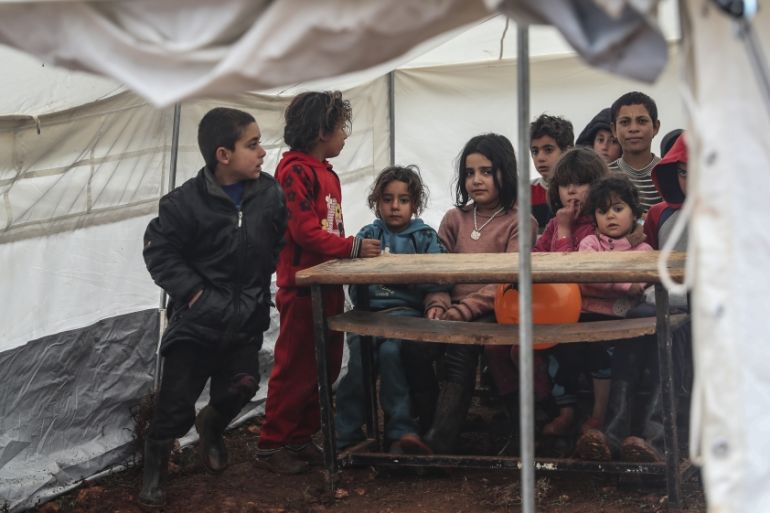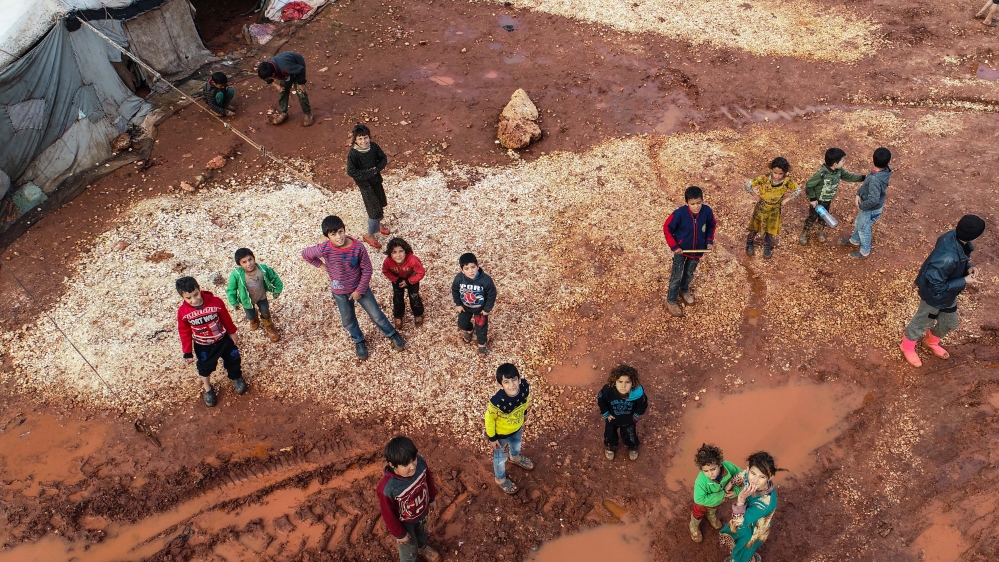‘Unabated violation’: Report highlights Syria war’s child victims
UN Commission of Inquiry details plight of Syrian children facing displacement, abuse and deaths in nine-year war.

In Syria‘s civil war, girls as young as nine have been raped and forced into sexual slavery. Boys have been tortured, forced into military training, and ordered to carry out killings in public. Children have been targeted by sniper fire and used as bargaining chips to extract ransoms.
The gruesome facts have been the focus of a new report published on Thursday by United Nations-backed investigators into the Syrian war – a report that, for the first time, looks solely on the plight of the children caught up in the conflict.
Keep reading
list of 4 itemsTunisia: The migration trap
Children of the Darien Gap
Girls in Africa have every right to be children
-
Four Syrian children killed in New Year’s Day attack on school
-
Syria: Half of Idlib’s children may miss school as battles rage
The group behind the report, known as the Commission of Inquiry on Syria, has been scrutinising and chronicling human rights violations since shortly after the conflict broke out in 2011.
The investigators said in their report that the abuse and violence against Syrian children goes well beyond just getting caught in the crossfire of warring sides.
“After eight years of conflict, children in Syria have experienced unabated violations of their rights: they continue to be killed, maimed, injured and orphaned, bearing the brunt of violence perpetrated by warring parties,” the report said.
It did not offer a casualty count among children – the commission stopped counting the victims years ago, citing its inability to verify the figures in a country where it has been blocked from entry.
The report did, however, say five million children have been displaced internally and outside Syria, “robbed of their childhood” by violations from all sides.
‘Education is devastated’
Hanny Megally, a member of the UN Commission of Inquiry on Syria, told Al Jazeera that he found it shocking how little hope there seemed to be for the Syrian children going forward.
“We’re still seeing preventable deaths,” he said, speaking from Geneva. “Education is devastated. We are talking about a generation that has lost schooling. In what way will they be able to catch up?”
The Syrian government, Megally explained, often does not recognise education certificates from children who went to school in areas under the control of the opposition armed groups.
He said this results in children facing the process of restarting their education from scratch, looking for work on the streets as breadwinners for their families, or being recruited by armed groups into fighting.
“And so the victims become the perpetrators, although children should be viewed as victims first,” said Megally.
“Urgent efforts are required by the Syrian government to support as many children as possible to return to [their] education,” said UN commission member Karen AbuZayd.
“Armed groups holding territory also need to act with haste to facilitate access to education,” she added.
Mental trauma
The UN report also highlighted the mental trauma that many children suffer from experiencing attacks, sieges, torture, detention and flight – and from losing their normal way of life.
“Many boys and girls have described how they suffer from serious sleeping disorders, as well as feelings of insecurity, abandonment, revenge, frustration and fear,” the commission said, summing up 5,000 interviews with Syrian children and adults.

Syrian President Bashar al-Assad‘s government, which bears responsibility for respect of human rights on its territory under international law, ignored such commitments, the report said.
It cited pro-government fighters as “regularly targeting children using sniper fire” and deploying cluster munitions, thermobaric bombs and chemical weapons, “often against civilian objects such as schools and hospitals”.
As with its previous reports, the three-member Commission of Inquiry listed recommendations for the warring sides, the Syrian government and the international community. But there are concerns the report will, like many others in Syria’s civil war, now in its ninth year, go unheeded and bring about few concrete results.
“The first thing that could be done is that everybody stops bombing schools and facilities that children need desperately going forward,” Megally said. “We need to be looking at the medical facilities and humanitarian assistance that children need desperately because they are dying.”
“There’s nothing that should be preventing humanitarian assistance other than bureaucracies, UN resolutions, and lack of cooperation on the part of the states,” he added.
Children of ISIL fighters in prisons, camps
The report also called for thousands of children of fighters who fought for the ISIL group (also known as ISIS) to be repatriated from Syria.
The report said the children were in a “particularly precarious” situation since they often lacked official papers.
“This, in turn, jeopardises their rights to a nationality, hinders family reunification processes and puts them at a higher risk of exploitation and abuse,” the report said.
The UN says around 28,000 children of foreign fighters are living in Syrian camps – 20,000 of them from Iraq.
Thousands more are believed to be held in prisons, where teenage children are being detained alongside adults.
The UN commission’s chair, Paulo Pinheiro, said the detention of children with adults was “a terrible violation”, urging the relevant governments to take action to stop this.
“All this delay in not taking these children from these prisons is outrageous. It’s a scandal,” he said.
The UN commission called on governments to recognise papers issued by non-state actors such as the ISIL group and witness testimonies to allow the children to obtain official documents.
Following the collapse of the self-proclaimed caliphate of ISIL last year, foreign fighters from nearly 50 countries were detained in Syria and Iraq.
Many of their relatives are held in the overcrowded al-Hol camp in northeastern Syria, home to around 68,000 and where more than 500 people – mostly children – died in 2019.